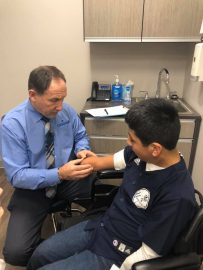
For individuals who rely on prosthetic devices to enhance their mobility and quality of life, proper prosthesis care is essential. Regular maintenance and upkeep of prosthetic devices can help prolong their lifespan, ensure optimal functionality, and prevent potential issues or discomfort. Whether you are new to using a prosthesis or have been a longtime user, it is important to understand the basics of prosthesis care. In this blog post, we will discuss essential maintenance tips to help you take care of your prosthetic device effectively.
Clean and Inspect Your Prosthesis Regularly
Keeping your prosthesis clean is key to maintaining its functionality and preventing skin irritation or infections. Regularly clean your prosthesis with mild soap and water, making sure to dry it thoroughly to prevent moisture buildup. Inspect your prosthesis for any signs of wear and tear, such as loose components, cracks, or worn-out padding. Addressing these issues promptly can help prevent further damage and ensure that your prosthesis remains safe and comfortable to use.
Follow Manufacturer Guidelines
It is important to follow the manufacturer’s guidelines for caring for your specific type of prosthesis. Different types of prosthetic devices may require different maintenance procedures and materials. By adhering to the manufacturer’s recommendations, you can ensure that your prosthesis remains in optimal condition and functions as intended. If you have any questions about caring for your prosthesis, do not hesitate to reach out to your prosthetist or healthcare provider for guidance.
Properly Store Your Prosthesis When Not in Use
When you are not wearing your prosthesis, it is important to store it properly to prevent damage and extend its lifespan. Avoid leaving your prosthesis exposed to extreme temperatures, direct sunlight, or moisture, as these can degrade the materials and components over time. Instead, store your prosthesis in a cool, dry place, ideally in a protective case or bag to prevent dust and debris from accumulating on it. Proper storage can help preserve the integrity of your prosthesis and ensure that it remains in good condition.
Practice Good Skin Care
Maintaining healthy skin is crucial for individuals who use prosthetic devices, as skin issues can impact the fit and comfort of the prosthesis. Practice good skin care by keeping the residual limb clean and moisturized, using a prosthetic liner or sock to prevent friction and pressure sores, and inspecting your skin for any signs of irritation or redness. If you notice any skin issues, consult with your prosthetist or healthcare provider for guidance on how to address them effectively.
Schedule Regular Prosthetic Maintenance
In addition to your own care routine, it is important to schedule regular maintenance appointments with your prosthetist or healthcare provider. During these appointments, your prosthetist can assess the condition of your prosthesis, make any necessary adjustments, and address any issues that may arise. Regular maintenance can help ensure that your prosthesis fits properly, functions optimally, and remains comfortable to wear. It is recommended to schedule maintenance appointments at least once a year, or more frequently if needed.
Stay Active and Exercise Safely
Staying active and participating in regular exercise can help improve your mobility and overall well-being, but it is important to do so safely when using a prosthetic device. Choose activities that are appropriate for your level of mobility and fitness, and always follow proper techniques to prevent injury or damage to your prosthesis. Consider working with a physical therapist or prosthetist to develop a safe and effective exercise routine that takes into account your prosthetic device and individual needs.
Be Mindful of Changes in Your Residual Limb
Changes in the size or condition of your residual limb can affect the fit and comfort of your prosthesis. Pay attention to any fluctuations in the size or shape of your residual limb, as these may require adjustments to your prosthetic device. Factors such as weight gain or loss, changes in muscle mass, or fluctuations in fluid retention can all impact the fit of your prosthesis. If you notice any changes in your residual limb, contact your prosthetist for evaluation and adjustments as needed.
Summary
Proper prosthesis care is essential for maintaining the functionality, comfort, and longevity of your prosthetic device. By following these essential maintenance tips, you can ensure that your prosthesis remains in optimal condition and provides you with the mobility and independence you desire. Remember to clean and inspect your prosthesis regularly, follow manufacturer guidelines, store your prosthesis properly, practice good skin care, schedule regular maintenance appointments, exercise safely, and be mindful of changes in your residual limb. With proper care and attention, you can make the most of your prosthetic device and enjoy a full and active lifestyle.
Need a Prosthetic and Orthotic Laboratory in Farmingdale, NY?
Prothotic Labratories, Inc. is a family-owned and -operated prosthetics and orthotics specialist based in Farmingdale, New York since 1988. We offer the highest quality of products, services, and patient care for all of your prosthetic and orthotic management needs. We specialize in pediatric prosthetics, but also offer adult products and services as well, such as scoliosis management, creating custom-designed prosthetics for the upper or lower extremities, and much more. We also have extensive experience in the orthotic management of cerebral palsy, arthrogryposis, osteogenesis imperfecta, spinal muscular atrophy, and neuromuscular and idiopathic scoliosis. Give us a call today, or visit us for more information!
